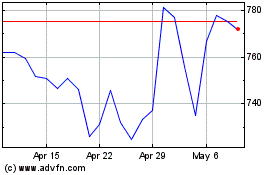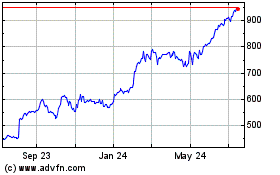Eli Lilly Earnings, Halted Covid-19 Drug Trial Disappoint Investors
October 27 2020 - 2:37PM
Dow Jones News
By Peter Loftus
Eli Lilly & Co. reported lower-than-expected quarterly
earnings due to pricing pressure on top products, while the
drugmaker said it would proceed with plans to introduce a new
Covid-19 antibody treatment despite a setback in one of several
clinical studies of its uses.
The Indianapolis-based company said it would continue pursuing
U.S. authorization for an antibody drug to treat Covid-19 patients
in the early course of illness and with a mild to moderate version
of the disease. That comes after the National Institute of Allergy
and Infectious Diseases said late Monday that it would close a
study of that drug, named LY-CoV555, being testing in combination
with other treatments. The institute concluded the antibody drug
didn't provide a clinical benefit to hospitalized patients.
Eli Lilly Chief Executive David Ricks said Tuesday that the
halted study doesn't signal significant concerns for LY-CoV555's
safety. "We've learned antibodies are more likely to work early in
the disease and are less likely to be effective in later stages of
the disease," he said in an interview after the company reported
its third-quarter results.
A separate study had shown that the antibody drug reduced
hospitalization rates in people with mild to moderate Covid-19, and
this is the basis for Lilly's request for U.S. regulators to
authorize its use. Eli Lilly plans to continue testing the drug in
other studies, in patients early in the course of their disease,
and in people at risk of infection including staff and residents at
nursing homes.
Lilly shares dropped 5.6% to $133.73 in recent trading Tuesday,
which analysts attributed to investor disappointment in the
antibody study as well as third-quarter results that missed
expectations. The company lowered its profit guidance for 2020,
though it projected continued recovery in the health-care sector
despite the continuing pandemic.
The company said it expects new prescriptions for patients to
continue to recover in the U.S. Company executives also expect
general health-care activity to accelerate following a slump
earlier in the pandemic as providers shift to telehealth.
Jared Holtz, a health-care equity strategist at financial
services firm Jefferies, called the quarterly results slightly
disappointing and said the setback for the Covid-19 antibody drug
makes Lilly a less formidable player in the hunt for
treatments.
The study that the NIAID halted was testing whether adding
LY-CoV555 to standard treatment -- including the antiviral drug
remdesivir -- would improve outcomes in hospitalized Covid-19
patients versus standard treatment alone. The study was designed to
isolate the effect of the Lilly antibody.
Enrollment in the study of the drug combination had been paused
earlier this month over a potential safety concern stemming from a
difference in the clinical status between Covid-19 patients who
received the Lilly drug and those who got a placebo. An independent
board overseeing the trial that identified the disparity later said
it found no significant differences in safety outcomes between
those two sets of patients. The board instead decided to recommend
that no more trial participants be given the Lilly drug because of
"lack of clinical benefit" in hospitalized patients, according to
the NIAID.
The company Tuesday reported a third-quarter profit decline to
$1.21 billion, or $1.33 a share, from $1.25 billion, or $1.37 a
share, in the same three-month period a year earlier. On an
adjusted basis excluding certain items, Eli Lilly's profit was
$1.54 a share. Analysts polled by FactSet had forecast an adjusted
profit of $1.71 a share.
Revenue rose 5% to $5.74 billion from $5.48 billion a year
earlier, but short of the analysts' forecast of $5.88 billion.
The revenue shortfall came primarily from lower-than-expected
sales of Lilly's top drug, the diabetes treatment Trulicity. Lilly
said that although it made modest list-price increases in the U.S.,
it had lower realized prices due to changes in its estimates of
rebates and discounts for the drug. As a result, sales growth was
lower than prescription volume growth.
Overall, lower realized prices reduced sales growth by five
percentage points for the quarter, Lilly said.
--Matt Grossman contributed to this article.
Write to Peter Loftus at peter.loftus@wsj.com
(END) Dow Jones Newswires
October 27, 2020 14:22 ET (18:22 GMT)
Copyright (c) 2020 Dow Jones & Company, Inc.
Eli Lilly (NYSE:LLY)
Historical Stock Chart
From Mar 2024 to Apr 2024

Eli Lilly (NYSE:LLY)
Historical Stock Chart
From Apr 2023 to Apr 2024
